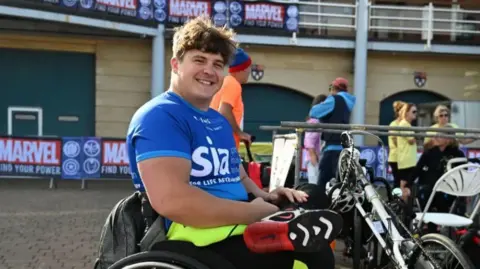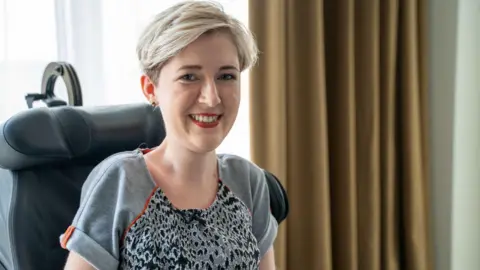'My mission to get myself weighed ended on a set of scrapyard scales'
 Dave Eastham
Dave EasthamDave Eastham could not believe what it had come to, when he arrived at a scrapyard in north Manchester in search of scales to find out his weight.
The 30-year-old has used a wheelchair since injuring his spine in a traffic accident a decade ago, and wanted to know if his exercise routines were helping to build muscle mass during a Covid fitness drive.
Dave had called several hospitals trying to find accessible scales, he says, without any luck. He'd also called several vet surgeries, and had even attempted to get on the scales at his local Pets at Home store, which he had to wheelie onto - all without success.
Having run out of the options that most people can do at home, at the gym or during routine medical appointments, Dave decided to "take matters into my own hands" and ask the local scrapyard if he could use the large scales they usually use for metal and other materials.
The experience was "degrading", he says.
For lots of disabled people, knowing an accurate body weight is crucial for healthcare.
The lack of accessible weighing scales for many disabled people around the country hit headlines in the last week, after wheelchair user Sarah Rennie was advised by her local NHS trust to use a weighing scale designed for animals at Pets At Home.
She said the episode was "dehumanising". The trust has since apologised.
"It just shows how hard it is now to exist with accessibility needs," Sarah says.
"There are serious consequences to overlooking something as basic as access to understanding changes to your body."
 Sarah Rennie
Sarah RennieDave says he was nervous about the reaction that he might get from the young men working at the scrapyard, but says they were brilliant with him.
He had to do a difficult transfer to lift himself onto the scales, which are designed for scrap mental, not humans.
"It probably wasn't good for my skin, the scales were full of copper and debris," Dave says, adding that it was only possible because of his fitness levels.
"Although it wasn't a bad experience, it wasn't something I wanted," he says.
Dave says he had tried to contact several local hospitals in his attempts to get himself an accurate weight, though without an appointment. One of them, North Manchester General Hospital, run by Manchester University NHS Foundation Trust, said all patients who are referred to them and require accessible scales can access them as part of their care - but added that Dave had not been referred to them as a patient when he got in touch.
"We recognise how important it is for individuals to be able to monitor their health and remain committed to making our services as inclusive and accessible as possible for our patients," a spokesperson added.
'Not entirely surprised'
Dr Hannah Barham-Brown, a GP and disability expert, says she was "horrified" to hear about the experiences of Dave and Sarah - "but sadly not entirely surprised".
She says knowing the weight of patients is important for a "whole range of reasons", including providing accurate medicine dosages and assessing eligibility for certain treatments and surgeries.
Dr Barham-Brown says it's "impossible to know" how many accessible scales are available across the NHS.
"These scales certainly aren't widely available, which is a travesty and means wheelchair users face unnecessary health inequalities," she says.
"We see similar issues with limited access to hoists in GP practices, meaning that hoist-dependent wheelchair users are unable to have routine screening and examinations, such as cervical screening."
An NHS spokesperson said: "We expect NHS organisations to provide reasonable adjustments for patients to ensure equitable access to services, including access to weighing equipment."
 Spinal Injuries Association
Spinal Injuries AssociationGary Dawson, from the Spinal Injuries Association, says experiences like Dave's and Sarah's are "unacceptable and humiliating", adding that accessible scales are also "shockingly" limited for other disabled people living across the UK.
He says this is not the first time he has heard of people resorting to using scales at scrapyards, as well as garages and equestrian centres, to get weighed.
He says weight management is crucial for those living with disabilities to keep on top of their healthcare.
Neeru Naik, from Muscular Dystrophy UK, says that they have also had calls to their helpline highlighting the lack of suitable weighing equipment in hospitals around the country.
It's a problem that many disability campaigners are doing their best to fix.
Andy Wood, a speech and language therapist from York, did a sponsored wheelchair walk with other volunteers back in 2011, to raise money for accessible scales in the community.
The scales are still used "almost daily", Andy says, and have been an "incredible benefit" to people in the area.
Dave now works in a spinal injuries centre supporting people with similar injuries to his own, which means he can use the scales there, but knows that "everyone else isn't in that position".
Many people have to drive long distances to get to the centre, Dave says, adding that he thinks accessible scales should be available for all wheelchair users close to where they live.
"Everyone likes to look after themselves. If you can weigh yourself, it can help get you into stuff like sports and keep you motivated," he says.
"It's about that self-pride."
